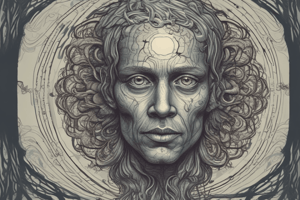Podcast
Questions and Answers
Which of the following accurately describes a primary advantage of second-generation antipsychotic drugs over first-generation ones?
Which of the following accurately describes a primary advantage of second-generation antipsychotic drugs over first-generation ones?
- Greater extrapyramidal side effects
- Higher effectiveness for negative symptoms (correct)
- Ineffectiveness against cognitive impairments
- Increased risk of tardive dyskinesia
What is a common adverse reaction associated with second-generation antipsychotics?
What is a common adverse reaction associated with second-generation antipsychotics?
- Acute renal failure
- Agranulocytosis
- Severe dizziness
- Weight gain and metabolic syndrome (correct)
How do some antipsychotic drugs affect muscarinic receptors?
How do some antipsychotic drugs affect muscarinic receptors?
- By stimulating dopamine pathways to balance mood
- By enhancing the levels of Ach, leading to greater side effects (correct)
- By directly activating them to increase neurotransmitter release
- By blocking them, reducing anticholinergic effects
What serious condition is associated with antipsychotics characterized by muscle rigidity and rapid rise in body temperature?
What serious condition is associated with antipsychotics characterized by muscle rigidity and rapid rise in body temperature?
What is the typical plasma half-life range for many antipsychotic drugs?
What is the typical plasma half-life range for many antipsychotic drugs?
Which antipsychotic is known for its risk of causing agranulocytosis?
Which antipsychotic is known for its risk of causing agranulocytosis?
How can depot antipsychotic injections enhance patient compliance?
How can depot antipsychotic injections enhance patient compliance?
In behavioral emergencies, which medication is typically administered to manage hyperactive psychotic states?
In behavioral emergencies, which medication is typically administered to manage hyperactive psychotic states?
Which symptom is primarily linked to hyperactivity in the mesolimbic pathway?
Which symptom is primarily linked to hyperactivity in the mesolimbic pathway?
What is a common side effect associated with typical antipsychotics due to D2 receptor blockade in the nigrostriatal pathway?
What is a common side effect associated with typical antipsychotics due to D2 receptor blockade in the nigrostriatal pathway?
Which receptor type is primarily targeted by second-generation antipsychotics alongside D2 receptors?
Which receptor type is primarily targeted by second-generation antipsychotics alongside D2 receptors?
What is a notable advantage of atypical antipsychotics compared to typical antipsychotics?
What is a notable advantage of atypical antipsychotics compared to typical antipsychotics?
Which of the following drugs is classified as a first-generation antipsychotic?
Which of the following drugs is classified as a first-generation antipsychotic?
Which cognitive function is particularly associated with hypoactivity in the mesocortical dopaminergic pathway?
Which cognitive function is particularly associated with hypoactivity in the mesocortical dopaminergic pathway?
What condition can result from D2 receptor blockade in the tuberoinfundibular pathway?
What condition can result from D2 receptor blockade in the tuberoinfundibular pathway?
Which neuroreceptor's hypofunction is implicated in the cognitive deficits and negative symptoms of schizophrenia?
Which neuroreceptor's hypofunction is implicated in the cognitive deficits and negative symptoms of schizophrenia?
What is a primary mechanism of action for first-generation antipsychotics?
What is a primary mechanism of action for first-generation antipsychotics?
Which side effect is most commonly associated with second-generation antipsychotics?
Which side effect is most commonly associated with second-generation antipsychotics?
What aspect of schizophrenia is primarily addressed by antipsychotic medications?
What aspect of schizophrenia is primarily addressed by antipsychotic medications?
Which neurotransmitter system is primarily implicated in the positive symptoms of schizophrenia due to dysregulation?
Which neurotransmitter system is primarily implicated in the positive symptoms of schizophrenia due to dysregulation?
A common off-label use of second-generation antipsychotics is in the treatment of which condition?
A common off-label use of second-generation antipsychotics is in the treatment of which condition?
What is a significant risk associated with the prolonged use of first-generation antipsychotics?
What is a significant risk associated with the prolonged use of first-generation antipsychotics?
Which clinical efficacy is typically highlighted for second-generation antipsychotics compared to first-generation?
Which clinical efficacy is typically highlighted for second-generation antipsychotics compared to first-generation?
What type of behavior can be a symptom of schizophrenia characterized by unpredictable actions?
What type of behavior can be a symptom of schizophrenia characterized by unpredictable actions?
Flashcards are hidden until you start studying
Study Notes
Schizophrenia
- Chronic and complex psychiatric disorder
- Affects thinking, reality perception, emotional management, and social interaction
- Affects young people, often chronic and disabling
- Affects 1% of the population
Symptoms
- Delusions: False beliefs not shared by cultural reality (e.g., persecution, special powers)
- Hallucinations: Sensory experiences without stimuli, often auditory
- Disorganized Thinking: Incoherent speech, difficulty organizing thoughts
- Disorganized/Catatonic Behavior: Unpredictable, bizarre, or repetitive behaviors
- Negative Symptoms: Diminished emotional and social abilities (e.g., apathy, withdrawal)
Other Symptoms
- Anxiety, guilt, depression, and self-punishment
- Suicide attempts in 50% of cases
- "Selective attention" problems
Etiology: Multifactorial
- Genetics: Strong familial predisposition
- Environmental factors: Perinatal complications, prenatal viral infections, early trauma
- Neurobiology: Dysregulation in the dopaminergic system and neurotransmitter imbalances
Dopaminergic Dysregulation
- Mesolimbic pathway: Hyperactivity linked to positive symptoms (e.g., hallucinations, delusions)
- Mesocortical pathway: Hypoactivity linked to negative symptoms (e.g., flat affect) and cognitive deficits
Other Neurotransmitter Systems
- Glutamate: Hypofunction of NMDA receptors in the prefrontal cortex and hippocampus
- GABA: Dysfunctions contribute to symptoms and cognitive deficits
Antipsychotic Drugs
- Two Groups: 1st Generation (Typical) & 2nd Generation (Atypical)
1st Generation (Typical)
- Primarily block D2 receptors
- Reduce positive symptoms but often cause significant motor side effects
- Examples: Chlorpromazine, Haloperidol, Fluphenazine, Flupentixol, Clopentixol
2nd Generation (Atypical)
- Block both D2 and 5-HT2A receptors
- Offer a more balanced treatment of positive and negative symptoms
- Lower risk of extrapyramidal side effects
- Carry a risk of metabolic issues
Dopaminergic Pathways
- Mesolimbic pathway: Involved in emotional regulation and motivation
- Mesocortical pathway: Associated with cognitive and affective functions
- Nigrostriatal pathway: Controls motor function
- Tuberoinfundibular pathway: Regulates prolactin secretion
Antipsychotic Side Effects (General)
- Extrapyramidal side effects (EPS): Movement disorders (e.g., tremors, muscle rigidity)
- Metabolic syndrome: Weight gain, hyperglycemia, dyslipidemia
- Anticholinergic effects: Dry mouth, constipation, blurred vision
- Risk of QT prolongation: Alteration in cardiac electrical activity
- Jaundice
- Antipsychotic malignant syndrome (AMS): Muscle rigidity, rapid rise in body temperature, mental confusion (potentially fatal)
Pharmacokinetics
- Absorption: Oral or injection
- Half-life: 15-30 hours
- Slow-release (depot) preparations available: IM injection for 2-4 weeks
Clinical Uses
- Behavioral emergencies: Control hyperactive psychotic states (e.g., chlorpromazine, haloperidol, olanzapine, risperidone)
- Schizophrenia: First-generation drugs and newer antipsychotics
- Clozapine: Effective against 'negative' symptoms but can cause agranulocytosis
Important Notes
- Compliance: 40% of schizophrenic patients fail to take medication as prescribed
- Acute toxicity: Antipsychotic drugs have a low acute toxicity
- Higher risk of side effects: Antipsychotic drugs with stronger muscarinic antagonism may have fewer side effects.
Studying That Suits You
Use AI to generate personalized quizzes and flashcards to suit your learning preferences.




